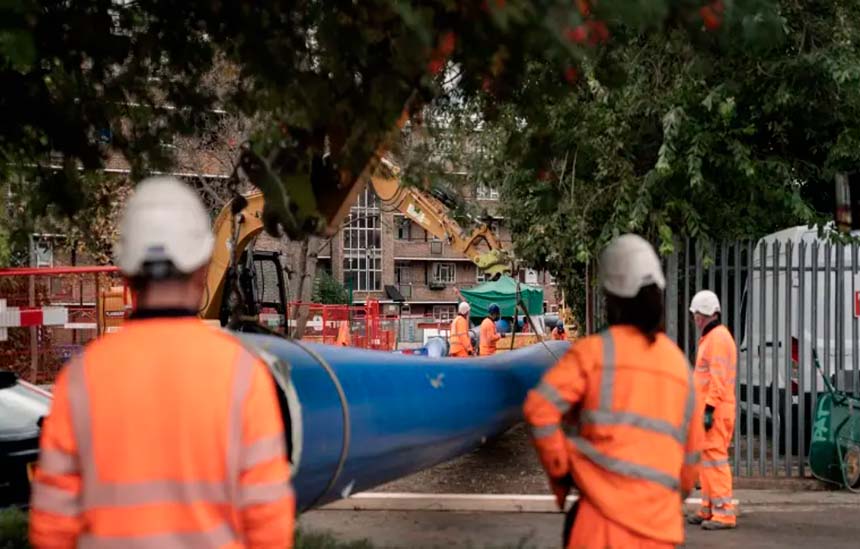- Thames Water is in the final stages of completing its £21.1m investment programme to protect water supply in London for generations to come
- The ambitious project uses high-tech lining, upgrading over 2,400 meters of water mains pipes in North East London
- The state-of-the-art technology has meant less disruptions for residents and completion of works carried out two-months ahead of schedule on Finsbury Park Road
- TfL supported the initial technology trial with over £550,000 of investment under its Lane Rental Fund, which supports projects that reduce disruption to customer journeys
- The investment will mean fewer leaks and supply interruptions for local customers, with the water pipes supplying tens of thousands of homes in the area
Thames Water has commenced the final stages of its project to future-proof water pipes across North East London. The multi-million-pound upgrade, which includes three large trunk mains, will build resilience across the local area and keep taps flowing for customers.
The original Victorian water pipes were laid in the 1800s and have survived the London bombings in both World War I and World War II. Thames Water is investing in innovative technology to reline its aging pipes, with the aim to reduce leakage across London and keep customers in supply.
Around 1.2km of water pipes have been upgraded on Seven Sisters Road, through to Finsbury Park Road, Queens Drive and Myddleton Avenue. The pipe replacement on Seven Sisters Road fixed 17 leaks.
The final phase of the project will upgrade the remaining 1.4km of water pipes from Finsbury Park Road to Myddleton Avenue, with work due to complete in summer 2024.
Thames Water is using innovative Die Draw technology to improve its Victorian infrastructure, bringing it up to date for the 21st century.
The method requires two excavation points, whereby engineers dig down at either end of the existing pipe, to avoid digging up miles of road along some of London’s busiest streets, reducing noise and disruption for residents in the process.
The pipe is cleaned out and a new plastic liner is pulled through which expands to fit, reducing the risk of leaks and improving resilience.
Esther Sharples, Operations Director for London said: “We’re committed to reducing leakage across London, which is why we are upgrading our network of aging pipes, some of which are over 150 years old.
“Due to a history of leaks in the area, it was clear we needed to urgently upgrade our pipes. This multi-million-pound investment will build resilience for the future and keeping taps flowing for our customers.
“The Die Draw technology has significantly accelerated the project delivery and mitigated traffic build up along a busy TfL route, while reducing noise and disruption for residents in the process.”
Thames Water has taken a collaborative approach to the project, working in partnership with its suppliers, TfL, and three London authorities to carry out the extensive upgrades, including Haringey Council, Hackney Council, and Islington Council, with the work covering all three areas.
The company secured over £550,000 of funding from TfL’s Lane Rental fund to trial the Die Draw technology because it reduced the need for long road and rail closures.
Nick Owen, TfL’s Head of Network Performance, said: “London’s road network plays an absolutely vital role in keeping the capital moving, which is why we work closely with utility companies to reduce the impact of roadworks.
“The use of innovative new technology like this, funded by our pioneering Lane Rental scheme, is making a real difference in reducing delays on our roads, cutting congestion and the pollution it can cause. Lane Rental has allocated more than £3 million of funding to Thames Water projects since it began. We’ll carry on working closely with Thames Water and other utility companies to ensure even more projects can benefit from the ground-breaking technology that the Lane Rental scheme funds.”
Thames Water has also been working alongside contractor Morrison Water Services to deliver the major upgrade.
Speaking on the project, Tom Shanahan, Project Manager at Morrison Water Services, said: “This has been a great example of a project team pulling together to use technology to solve a complex issue.”
“Traditional open cut installation of this main would have caused huge disruption to the community, but using the Die Draw technology has led to a highly successful installation, renewing water mains pipes with minimal community impact.”

